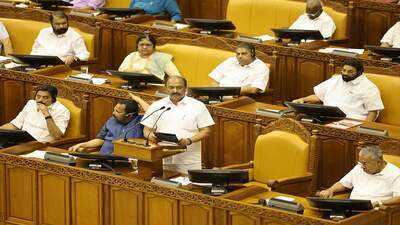
Thiruvananthapuram | The fifth and final budget of the second Pinarayi Vijayan government in Kerala presented on Friday lacked any major populist measures, but proposed a hike in the road tax on electric vehicles as a revenue-boosting measure and focused more on infrastructure development.
The budget for the year 2025-26 presented in the Assembly by Finance Minister K N Balagopal also proposed an increase in land tax, road tax on over 15-year-old private vehicles and court fees to raise its receipts, which is around Rs 27,000 crore short of its proposed expenditure for 2025-26.
The revenue-boosting measures have been included despite Balagopal's assertion that Kerala has navigated the financial constraints that have affected the state in recent years and has augmented its own tax revenue by 70 per cent.
Indicating a reform in the state's financial sector, the minister announced steps to transform the Kerala Infrastructure Investment Fund Board (KIIFB) into a revenue-generating entity, as it is burdened with substantial debt due to borrowings for various development projects worth over Rs 87,000 crore.
He said that despite major setbacks in terms of allocation of grants and tax share from the Union government, indicators like revenue deficit, fiscal deficit and debt burden have been significantly reduced during the tenure of this government.
"We are sustaining now by augmenting our own tax revenue, avoiding unnecessary expenses and prioritising other expenses. We will be able to augment the state's own tax revenue which was Rs 47,660 crore in 2020-21 to Rs 81,000 crore by the end of the financial year 2024-25." "This is an increase of 70 per cent in four years. The total own revenue of Kerala is increasing from Rs 54,988 crore to Rs 1,03,240 crore," he said.
Balagopal also said that the average annual expenditure of the government has increased by 40 per cent which has "influenced various sectors of the society".
There has been an enhancement in the amounts allocated to almost all sectors as compared to last year with the minister saying that this increase in the annual plan was made despite the severe fiscal crunch forced upon the state by the central government.
The minister said it has been decided to advance the construction of the second, third and fourth phases of the Vizhinjam port which is now slated to be completed by December 2028 well ahead of the initially agreed timelines. "This is something hitherto unheard of for the state," he said.
Announcing the government's infrastructure development plans for the state, Balagopal proposed a shipyard for southern Kerala.
The minister said the state government will engage further with the Union government on this matter and is committed to fulfilling all necessary responsibilities while expecting the Centre to take the initiative in establishing the shipyard.
He said the development of Kochi Metro will be ensured, while the government also aims to operationalise the Thiruvananthapuram and Kozhikode Metro rail systems, with preliminary activities for the Thiruvananthapuram Metro expected to commence in the 2025-26 financial year.
The minister said the government's ultimate goal is to develop Vizhinjam not as a mere transshipment hub, but as a major export-import (EXIM) port, like those in Singapore, Rotterdam, and Dubai.
In line with this vision, he announced the Vizhinjam-Kollam-Punalur Growth Triangle (VKP-GT), which aims to strengthen key transport corridors and facilitate the development of multi-modal parks, manufacturing hubs, storage facilities, processing units, assembling units, and logistics centres along the growth corridor.
Balagopal highlighted the impact of the Wayanad landslides in July last year. While the 2025-26 Union Budget has not allocated any assistance for the Mundakkai-Chooralmala disaster, the minister said that the Left government remains committed to its promises, earmarking Rs 750 crore for the first phase of rehabilitation and hoping for central support similar to that provided to other states.
In the budget, he also introduced the K-Homes project to maximise the potential of unoccupied houses in the state and enhance tourism infrastructure.
Additionally, the finance minister announced that the final installment of Rs 600 crore for the revision arrears of service pensions will be paid this month and the remaining three installments of the social security pension arrears will be disbursed in 2025-26.
To generate more funds to make up the deficit of over Rs 27,000 crore in its planned expenditure, the government proposes to increase land tax rates by 50 per cent, levy lifetime road tax on electric vehicles based on their cost, increase road tax on over 15-year-old private vehicles by 50 per cent and revise court fees. These proposals are expected to generate an additional revenue of Rs 335 crore.
"The Life Time Road Tax for electric vehicles, now levied at 5 per cent at present, will be rationalised based on the cost of the electric vehicle. For electric vehicles, cost above 15 lakh, the tax rate will be 8 per cent of the vehicle cost".
"For 20 lakh and above, it will be 10 per cent of the vehicle cost. The government would like to tax electric cars with battery renting facility at 10 per cent irrespective of the cost of the electric vehicle. Through this hike in tax, additional revenue of Rs 30 crore is expected," the minister said.